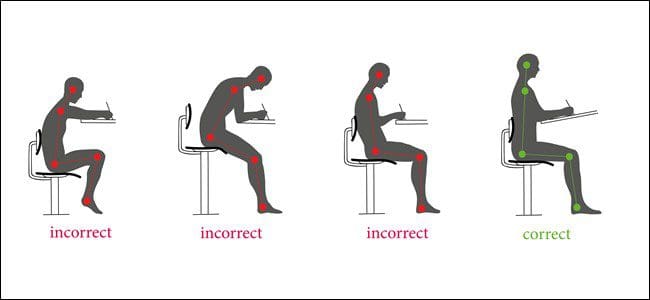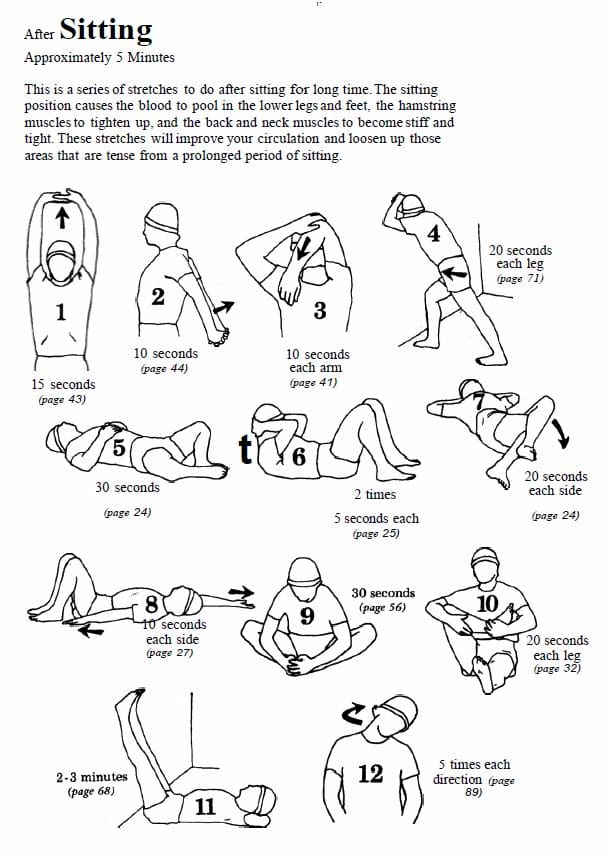Table of Contents
Introduction
From a young age, parents will always tell their kids to sit up straight or else they will have bad posture. As kids, we would tend to recline on the couch or chair, which would not affect our backs in the long run. However, as we age, move around more, and have jobs that require prolonged sitting or constantly looking down at our phones, our bodies are hunched or slouched for long periods. When the upper extremities, like the neck, shoulders, and thoracic region of the back, are hunched over, it can develop into future issues that cause musculoskeletal symptoms over time. When this happens, the muscle tissues begin to be overstretched. They could lead to overlapping problems that can cause many individuals to be dealing with upper back pain and areas of complaint. Today we are looking at the effects of poor posture, how prolonged sitting causes numerous symptoms, and how the MET technique relieves poor posture. We provide valuable information about our patients to certified medical providers offering available therapy treatments like the MET technique for individuals with poor posture and neck and back pain due to prolonged sitting. We encourage each patient appropriately by referring them to our associated medical providers based on their diagnosis results. We accept that education is a spectacular way when asking our providers the most crucial questions at the patient’s acknowledgment. Dr. Alex Jimenez, D.C., assesses this information as an educational service. Disclaimer
The Effects Of Poor Posture
Have you been dealing with muscle strains in your upper back, neck, and shoulders? Are you constantly hunched over at your desk or looking down at your phone? Or are you experience sciatic nerve pain from sitting down always? Many of these issues from prolonged sitting can rapidly develop into poor posture and affect the musculoskeletal system and the spine. Studies reveal that when many individuals spend a significant amount of time sitting, especially in an awkward position, which can cause an increased risk of spinal pain and other effects on the various muscle groups in the shoulders, neck, and thoracic region. Not only that but according to the book written by Leon Chaitow, N.D, D.O., and Judith Walker DeLany, L.M.T, “Clinical Application of Neuromuscular Techniques,” mentioned the muscles in the cervical, thoracic, and lumbar region of the body are among the first to be showing signs of changes in response to postural defects. To that point, when a person is slumped in a sitting position will cause strain to each muscle group in the back and affect both the upper and lower extremities of the body.
Prolonged Sitting & Symptoms
When many individuals are sitting down constantly, whether at a desk job or driving in a vehicle, it can take a toll on the entire body. When the body hasn’t been moving for a long time, it cause the individual to feel muscle strain and tightness in their upper body and a nagging sensation in their lower body. Studies reveal that prolonged sitting can cause discomfort in the lower back and causes reduced muscle endurance in the lower back, and could cause an increased risk of musculoskeletal disorders like sciatic nerve pain, where the gluteal muscles irritate the sciatic nerve causing radiating pain to travel down the legs. Another research study also reveals that being in a forced position for an extended period can cause an impact on the seating position of the upper body and can be associated with upper musculoskeletal disorders causing an area of complaints in the chin, back, neck, shoulders, arms, and hands. When a person has been sitting for an extended amount of time without taking a stretch break, the muscles begin to be in a constant state of contraction and become short and tense.
The Benefits Of Good Posture-Video
Have you noticed that you have been leaning forward when walking from one location to another? Do you feel muscle tightness or irritating pain in your shoulders or legs? Or have you been experiencing unwanted pain in your neck and lower back? Many of these issues are due to having a slouched or hunched-over posture that can develop neck and back pain. Poor posture can lead to unwanted symptoms affecting the muscles and joints. Poor posture is due to everyday factors like being hunched over, looking down at the phone, or leaning forward to the computer. These little actions may not initially cause muscle pain but will cause issues over time. Luckily, there are various treatments to reduce the effects of poor posture and help restore the body. The video above explains the benefits of having good posture and trying to prevent future injuries and muscle strain from returning.
The MET Technique For Poor Posture
There are numerous ways to reduce the effects of poor posture from further affecting the body and reducing pain in the various muscles and joints. A good way to relieve stiffness in the neck and back is to do multiple stretches to restore blood flow back to the muscles. Another way to prevent neck and back pain is to incorporate MET (muscle energy treatment) techniques. Studies reveal that when individuals utilize MET treatments combined with posture correction exercises and stretches, it can significantly decrease pain in the neck and back while improving the range of motion to the muscles and soft tissues. Doing light stretches can help relieve tense muscles and promote good posture, as many individuals are becoming more aware of how they present themselves when they are not hunched over.
Conclusion
When it comes to our bodies, it is important to know that being hunched over can lead to poor posture, and sitting down for an extended period can develop neck and back pain associated with overlapping symptoms. Poor posture can cause the muscles to become tense, short, and stiff, and when a person stretches from being hunched over will experience pain. Luckily, incorporating various stretches and using the MET technique allows the muscles to be stretched and prevent future injuries from reoccurring while allowing the individual to be more aware of their posture.
References
Chaitow, Leon, and Judith Walker DeLany. Clinical Application of Neuromuscular Techniques. Churchill Livingstone, 2002.
Joshi, Reema, and Nishita Poojary. “The Effect of Muscle Energy Technique and Posture Correction Exercises on Pain and Function in Patients with Non-Specific Chronic Neck Pain Having Forward Head Posture-a Randomized Controlled Trail.” International Journal of Therapeutic Massage & Bodywork, U.S. National Library of Medicine, 1 June 2022, www.ncbi.nlm.nih.gov/pmc/articles/PMC9134480/.
Jung, Kyoung-Sim, et al. “Effects of Prolonged Sitting with Slumped Posture on Trunk Muscular Fatigue in Adolescents with and without Chronic Lower Back Pain.” Medicina (Kaunas, Lithuania), U.S. National Library of Medicine, 23 Dec. 2020, www.ncbi.nlm.nih.gov/pmc/articles/PMC7822118/.
Kuo, Yi-Liang, et al. “Sitting Posture during Prolonged Computer Typing with and without a Wearable Biofeedback Sensor.” Int J Environ Res Public Health, 19 May 2021, ncbi.nlm.nih.gov/pmc/articles/PMC8161121/.
Ohlendorf, Daniela, et al. “Influence of Ergonomic Layout of Musician Chairs on Posture and Seat Pressure in Musicians of Different Playing Levels.” PloS One, U.S. National Library of Medicine, 11 Dec. 2018, www.ncbi.nlm.nih.gov/pmc/articles/PMC6289455/.
Disclaimer
Post Disclaimer
Professional Scope of Practice *
The information herein on "Everyday Poor Posture Relieved By The MET Technique" is not intended to replace a one-on-one relationship with a qualified health care professional or licensed physician and is not medical advice. We encourage you to make healthcare decisions based on your research and partnership with a qualified healthcare professional.
Blog Information & Scope Discussions
Welcome to El Paso's Wellness blog, where Dr. Alex Jimenez, DC, FNP-C, a board-certified Family Practice Nurse Practitioner (FNP-C) and Chiropractor (DC), presents insights on how our team is dedicated to holistic healing and personalized care. Our practice aligns with evidence-based treatment protocols inspired by integrative medicine principles, similar to those found on dralexjimenez.com, focusing on restoring health naturally for patients of all ages.
Our areas of chiropractic practice include Wellness & Nutrition, Chronic Pain, Personal Injury, Auto Accident Care, Work Injuries, Back Injury, Low Back Pain, Neck Pain, Migraine Headaches, Sports Injuries, Severe Sciatica, Scoliosis, Complex Herniated Discs, Fibromyalgia, Chronic Pain, Complex Injuries, Stress Management, Functional Medicine Treatments, and in-scope care protocols.
Our information scope is limited to chiropractic, musculoskeletal, physical medicine, wellness, contributing etiological viscerosomatic disturbances within clinical presentations, associated somato-visceral reflex clinical dynamics, subluxation complexes, sensitive health issues, and functional medicine articles, topics, and discussions.
We provide and present clinical collaboration with specialists from various disciplines. Each specialist is governed by their professional scope of practice and their jurisdiction of licensure. We use functional health & wellness protocols to treat and support care for the injuries or disorders of the musculoskeletal system.
Our videos, posts, topics, subjects, and insights cover clinical matters, issues, and topics that relate to and directly or indirectly support our clinical scope of practice.*
Our office has reasonably attempted to provide supportive citations and has identified the relevant research studies or studies supporting our posts. We provide copies of supporting research studies available to regulatory boards and the public upon request.
We understand that we cover matters that require an additional explanation of how they may assist in a particular care plan or treatment protocol; therefore, to discuss the subject matter above further, please feel free to ask Dr. Alex Jimenez, DC, APRN, FNP-BC, or contact us at 915-850-0900.
We are here to help you and your family.
Blessings
Dr. Alex Jimenez DC, MSACP, APRN, FNP-BC*, CCST, IFMCP, CFMP, ATN
email: coach@elpasofunctionalmedicine.com
Licensed as a Doctor of Chiropractic (DC) in Texas & New Mexico*
Texas DC License # TX5807
New Mexico DC License # NM-DC2182
Licensed as a Registered Nurse (RN*) in Texas & Multistate
Texas RN License # 1191402
ANCC FNP-BC: Board Certified Nurse Practitioner*
Compact Status: Multi-State License: Authorized to Practice in 40 States*
Graduate with Honors: ICHS: MSN-FNP (Family Nurse Practitioner Program)
Degree Granted. Master's in Family Practice MSN Diploma (Cum Laude)
Dr. Alex Jimenez, DC, APRN, FNP-BC*, CFMP, IFMCP, ATN, CCST
My Digital Business Card




